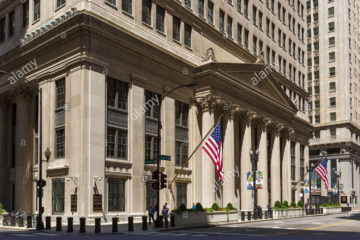Matt Levine’s Money Stuff: Investing Stores and Libyan Bribes

published May 4th 2017, 8:31 am
(Bloomberg View) —
Morgan Stanley vs. Vanguard.
Morgan Stanley runs investing stores across the country, and if you walk into their investing stores you will see investments on the shelves. You’ll browse around, pick out some investments that you like, maybe ask a sales associate for some help recommending an investment that will look good on you. Once you have filled your basket with investments, you will take them to the check-out counter, pay for them, and take them out to your car. It is all a very normal commercial transaction.
But you might look around and wonder: How did Morgan Stanley decide to put these investments, and not others, on the shelves? Of course you could ask that about any store. One part of the answer is, always, customer demand: The store wants to offer products that its customers want to buy, because that is how it makes money. Another slightly different answer is, often, customer service: The store wants to offer products that will be good for its customers, even if they don’t know that they want them, because over time the way to build loyalty is by selling customers things that they end up liking. And another part of the answer is, pretty much always, economics: The store wants to offer products with high margins — products that it can stock cheaply and sell expensively — because it is a business, and the more money it makes the happier it is. And so a big store might negotiate discounts or promotional money from suppliers — that is, try to get paid to stock one brand’s products rather than another’s — because that is a way to make money too.
These basic mechanisms explain how stores work, and stores are basically good. They mostly sell you stuff that you want, at markups that aren’t too exorbitant, because otherwise they would go out of business. At the same time, they are commercial entities, and they are generally not offering you those products out of love for you, or even out of disinterested aesthetic appreciation for those products. They’re offering you the products to make money, and they make careful commercial tradeoffs about building long-term customer loyalty versus selling the products that make them the most money now.
Anyway:
Morgan Stanley is slamming the door on selling Vanguard Group mutual funds, the latest attempt by a big brokerage firm to retaliate against the low-cost fund giant for refusing to pay for access to its salesforce.
As of Monday, May 8, the world’s biggest brokerage firm as measured by its 15,800 brokers will not permit them to sell new mutual funds managed by the world’s fastest-growing asset manager to clients, a company spokeswoman confirmed.
“Brokers and consultants said that Morgan Stanley is almost certainly retaliating against Vanguard because of the Valley Forge, Pennsylvania-based firm’s longstanding refusal to pay for brokerage firm ‘shelf space’ as part of its crusade to keep expenses for investors low,” though it is “part of a broader move by Morgan Stanley to cut its mutual fund menu by 25% in order to enhance research and due diligence on its investment products.”
That strikes me as fine! If you enjoy buying Vanguard investments, you will probably want to take your business elsewhere, but fortunately there are lots of investing stores that sell Vanguard products. (Or you could just shop online. That’s what I do, for investments and everything else that I buy; a lot of my money is in Vanguard funds, but it would never have occurred to me to walk into a retail broker’s office to buy them.) But if you otherwise like the ambience and customer experience of Morgan Stanley’s investing stores, then perhaps you won’t mind this change in the product mix, and will be content to buy some other brand of mutual fund.
I mean, look, I get that people think that retail brokers should all be fiduciaries! It is a sensible expectation, really. Financial products are complicated and important, and consumers have a tough time comparing them. (And the brokers themselves tend to hold themselves out as trusted advisers, though, to be fair, so do car salespeople.) The ideal retail financial adviser would tell her client to do exactly what is right for him, whether that is to buy a high-cost in-house mutual fund, or to buy a cheap Vanguard mutual fund, or to put his money in a bank account or a small business or a house or lottery tickets. But actual retail brokers work at investing stores that sell investments, and their job is to sell the investments that they sell, not to search the entire universe of financial assets for the perfect fit for their clients. (Plus it is hard to know ex ante what the exact right investment is!) If you walk into the investing store knowing that it works like a store, this won’t surprise you too much. If you expect something else, you may be disappointed.
How to win business in Libya.
In 2006, economic sanctions on Libya were lifted, and the country established a sovereign wealth fund — the Libyan Investment Authority — to invest its oil money. A giant pool of money appeared where there had been no pool of money before. Giant pools of money tend to attract banks, and Libya’s was especially attractive. The LIA had no pre-existing relationships with banks, no web of favors that it already owed to longstanding advisers, no special expertise in sophisticated finance — and just so much money. It was a blank page on which big international banks could write their own stories.
Obviously those stories ended with a lot of that money in the banks’ hands. And there were some pretty scandalous passages. Goldman Sachs Group Inc.’s LIA story is the best-known; it involved Goldman (allegedly) entertaining LIA officials with dinners, musical theater, prostitutes and copies of “Liar’s Poker.” (Disclosure: I used to work at Goldman, and know some of the characters in the story.) Later it involved Goldman losing LIA’s money, and an LIA official threatening to throw a Goldman banker out a window. Eventually Libya sued, claiming that Goldman had acquired undue influence over the naive LIA officials with all those dinners and prostitutes. But Goldman won, as a U.K. judge ruled that its efforts to cozy up to the LIA were just salesmanship, and didn’t create any obligation for Goldman to protect the LIA from itself.
Société Générale SA’s Libya story had some obvious similarities with Goldman’s — a period of relationship-building, followed by some weird derivative trades that were very lucrative for SocGen, followed by the LIA losing a lot of money on those trades, followed by a lawsuit — but today it ended very differently:
Societe Generale SA agreed to pay 963 million euros ($1.05 billion) to settle a legal dispute with the Libyan Investment Authority over alleged bribery, averting a trial and prompting a surprise drop in profit.
Goldman ended up paying back Libya zero dollars of the $1.2 billion it lost; SocGen ended up paying back $1.05 billion of the $1.5 billion it lost. This seems to be the main source of the difference:
Where the Goldman lawsuit was about undue influence, the SocGen case is about bribery. At the center of the dispute is a $58 million payment made by the French lender to Libyan businessman Walid Al-Giahmi. About $24 million of that payment went to a single official that has been granted anonymity, according to the LIA’s court filings.
Of course those words — “undue influence,” “bribery” — exist on a continuum. If you pitch derivatives to LIA officials in a conference room, and you serve sandwiches, that is regular — kind of chintzy — business. If you pitch them in a fancy restaurant, and pay for the food, that is also pretty normal, though, you know, check your expenses policy. If you pitch them in a brothel, then there will probably be a lawsuit, and the lawsuit will be very embarrassing for you, but you might win it. (Goldman did!) If your pitch consists of a suitcase full of cash, you’re gonna lose the lawsuit. Some gifts are just the everyday kindnesses that grease the wheels of commerce, and some gifts create “undue influence,” and some gifts are bribes.
The difference here is in part that Goldman sent its bankers to butter up the LIA, while SocGen hired a local businessman “for introductory services and market research,” which is often code for “to pass along bribes.” (“This is a complete exoneration of my client,” says his lawyer about the settlement, though.) One lesson is that actually developing relationships with local officials can work pretty well, and leave you relatively immune to accusations of corruption, while hiring fixers as a substitute for those relationships can lead you into trouble. The way to develop relationships is with long tedious work, including, yes, a lot of fancy dinners and maybe some more unsavory entertainments. It can be tempting to look for shortcuts, but those shortcuts often end up being suitcases full of cash, and that rarely works out well.
People are worried about non-GAAP accounting.
So now we have a natural experiment:
Facebook will, for the most part, only report numbers that come from Generally Accepted Accounting Principles or GAAP. It will limit the numbers it reports that don’t follow GAAP rules.
Specifically, Facebook is no longer reporting non-GAAP expenses, income, tax rate, and earnings per share (EPS), it says.
The difference is mainly about the expensing of stock-based compensation, which many tech firms like to omit from non-GAAP numbers. What will this do for Facebook’s stock price? Well, Facebook Inc. just reported GAAP net income of about $3.1 billion, or $1.04 per share, for the first quarter, down from about $3.6 billion ($1.21 per share) in the fourth quarter of 2016. The fourth quarter’s non-GAAP net income was about $4.2 billion, or about $1.41 per share. Facebook’s GAAP income is, roughly speaking, 16 percent below its non-GAAP income.
If your view of non-GAAP reporting is that companies that report non-GAAP numbers also always prominently report GAAP numbers, that investors can look through the difference, and that companies are valued based on the actual economics of their businesses and not on the formatting of their earnings reports, then you should expect this change to have zero effect on Facebook’s stock price. If your view of non-GAAP reporting is that companies that report non-GAAP “fantasy numbers” are entirely successful in fooling their investors into ignoring GAAP, then you should expect this change to lower Facebook’s stock price by about 16 percent.
So which is it? It is hard to disentangle the earnings from the formatting, but here:
Facebook reported better than expected earnings results based on generally accepted accounting principles, or GAAP, which it will now use to report its profit. But unlike Alphabet, Facebook gave investors no warning ahead of time that the change would be coming, which led to confusion among investors (and algorithms) that were expecting Facebook to report higher, non-GAAP numbers.
Facebook stock was down about 2 percent after hours. Alphabet Inc., meanwhile, “warned investors in January that it would begin reporting its earnings solely with GAAP results with the report it issued last week”; it reported last Thursday afternoon, and the stock closed up 3.6 percent on Friday. If Facebook also closes up today, despite abandoning the crutch of non-GAAP earnings, then that will be a good argument to other tech firms that they can get by without non-GAAP reporting. But, just as importantly, it will also be a good argument to everyone else that they can stop caring. If non-GAAP disclosures don’t affect stock prices, then that means that they don’t confuse investors, and there is really no reason to get worked up about them.
People are worried that people aren’t worried enough.
This, from Bank of America research analysts, is kind of weird:
Remarkably, average single stock realized vol has now fallen to the lowest level on record (data since 1990). Realized stock correlation is also at lows rarely seen over the past 15yrs and is in the 25th %-ile since 1990. Hence, more than simply option selling programs depressing index volatility, there is unprecedented little movement at the single stock level, and correlation between stocks has been crushed as Trump policy creates a constant rotation between winners and losers.
Index volatility is very low, single-stock volatility is very low, and stock correlation is also very low. Individual stocks don’t move very much, and the aggregate of stocks doesn’t move very much, but the individual stocks and the aggregate don’t move together. Everything is bouncing around randomly with no connection to anything else — they’re just not bouncing around very much. There’s an intuitive story connecting the decline of volatility to the rise of indexing: Investors can diversify more efficiently, so there’s less need to trade constantly and so less need for stocks to bounce around. But that doesn’t fit the facts: The index is quiet, and the individual stocks are quiet, but they’re quiet in different ways.
People are worried about duration.
The Treasury Borrowing Advisory Committee, a group of banks that advises the Treasury on demand for U.S. debt, does not share Treasury Secretary’s Steven Mnuchin’s interest in very-long-dated bonds:
The committee said it doesn’t see evidence of “notably strong or sustainable demand” for ultra-long bonds, adding however that issuing more longer-term debt could make sense if Treasury wanted to raise its borrowing capacity.
“The 100-year bond is not worth considering,” the TBAC says flatly, though it would reluctantly consider 40- or 50-year issuance. Or even weirder stuff:
One ultra-long issue that might be worth investigating further is a zero-coupon ultra (e.g., 50-year STRIPS). This product would provide pensions and insurers a security to maximize duration per unit of portfolio market value. Despite this, there are a number of issues that would need to be addressed, including tax issues, potential complications with the government debt limit, and systems development.
Back in the debt ceiling crisis, I was a fan of high-coupon bonds, which (I think) would allow the Treasury to borrow $275 while using just $100 in debt-ceiling cap space. In contrast, 50-year STRIPS would let Treasury borrow something like $15 for every $100 in debt-ceiling cap space. That is a pretty silly and non-economic constraint, but it seems to be real enough.
Break up the banks?
There are two poles in the vague half-serious argument about reinstating the Glass-Steagall Act and forcing big banks to break up into commercial and investment banks. On the one hand, there is the view that the current universal banks are too big to fail, and that breaking them up would make bank failures more manageable. On the other hand, there is the view that the current universal banks are diversified, with some businesses that do well when others do poorly, and that breaking them up would make bank failures more likely. Unsurprisingly, Bank of America Corp.’s Brian Moynihan is on that side:
The chairman and chief executive of BofA, the second-biggest US bank by assets, cited the example of his own bank, which stepped in to rescue Merrill Lynch, the crippled brokerage firm, during the depths of the 2008 crisis.
“What’s better, to have Merrill Lynch standing alone or tucked inside?” he said. “We can stabilise it in times of stress. That’s a better situation.”
This is a classic debate — should we make failure less likely, or less harmful? — and there is a good case that frequent mild failures are better than rare catastrophic ones: creative destruction, internalization of moral hazard, anti-fragility, all that good stuff. But that can lead you astray a bit in thinking about Glass-Steagall, which would reduce the diversification and stabilization advantages of the big banks without making them all that much smaller or less systemic. Breaking Bank of America into a hundred tiny community banks and a hundred tiny investment-banking boutiques would render the failure of any one of them harmless. But breaking it into a giant commercial bank and a giant investment bank would not.
Anyway none of this talk is meant to be taken particularly seriously:
Just last month, Trump’s top economic adviser Gary Cohn eased the concerns of at least two bank chief executives officers who called him after he spoke approvingly of Glass-Steagall in a meeting with senators, people familiar with the matter said. Neither Cohn nor the Treasury Department’s Craig Phillips made a case for splitting up banks when they met recently with an important financial lobbying group, said some attendees.
Oh come on.
The first law of working at the Securities and Exchange Commission is, apparently, don’t trade short-dated out-of-the-money call options on companies that you regulate. Or any options on any companies, really:
SEC employees are banned from holding stock in companies directly regulated by the SEC, such as banks, and they are also required to get clearance prior to trading. Trading in options, or other financial instruments that derive value from securities, is also banned for all SEC employees.
But former SEC corporation finance employee David Humphrey “is expected to settle criminal and civil charges, after he was caught illegally trading options while working at the agency.” The charges are about making false certifications on his ethics forms, not, alas, insider trading: “While employees there are likely to have access to material, non-public information, Humphrey is not expected to be accused of using any such information to inform his options trading strategy.” Nonetheless I am going to prophylactically announce a Sixth Law of Insider Trading, which is, if you are going to trade short-dated out-of-the-money options on the basis of inside information, please don’t do it while employed at the SEC. The SEC apparently notices that sort of thing. I do not expect this law to get much use — I suspect most of the SEC has figured it out on their own — but if it ever does, I will be so, so excited.
Things happen.
Goldman Sachs win streak is focus of Treasury-rigging probe. Puerto Rico Collapse Shows Debts Seen as Iron Clad May Not Be So. Red Flag for U.S. Business Schools: Foreign Students Are Staying Away. Two Market Giants Tried to Create a $75 Billion Mega-Exchange. Credit Suisse pays $400 million over toxic mortgages, failed U.S. credit unions. HSBC Shares Rise on Surprise Revenue Gain as Trading Tops Rivals. Rich Families Go Solo on Deals, Moving Away From Private Equity. SEC Probes Solar Companies Over Disclosure of Customer Cancellations. Uber and Waymo Duel at Key Hearing Over Driverless Car Technology. Banks Pull Back on Car Loans as Used-Auto Prices Plummet. Trump Administration Names Acting Comptroller of the Currency. China-Backed Plan to Prop Up Scandal-Plagued Malaysian Fund 1MDB Collapses. Hipster food. Cauliflower Is the New Kale. Crooks Are After the Grease From Your French Fries. More Fyre Festival post-mortem. Bombay Sapphire gin recalled in at least 5 provinces for containing too much alcohol.
This column does not necessarily reflect the opinion of the editorial board or Bloomberg LP and its owners.







No Comment